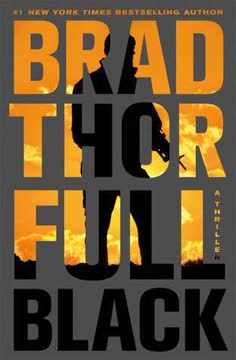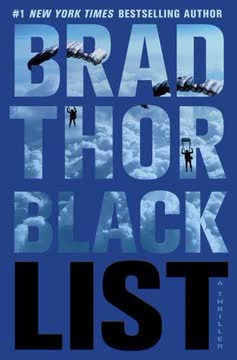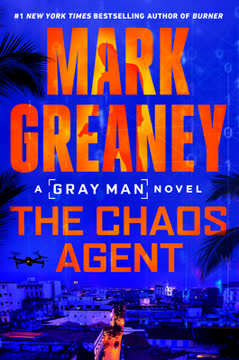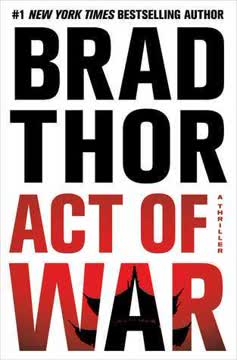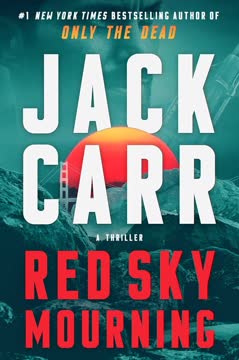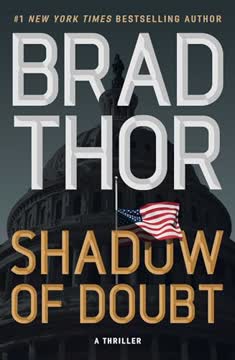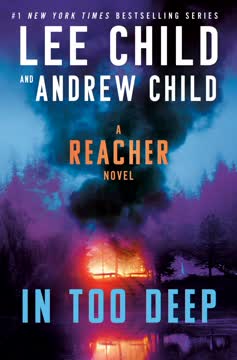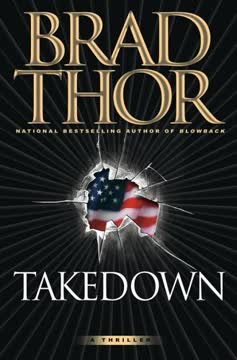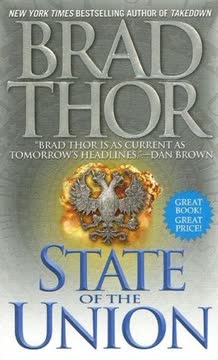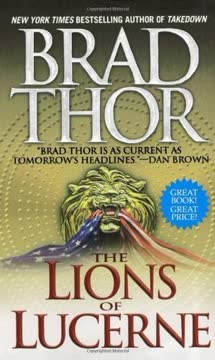Plot Summary
Covert Mission in Philippine Waters
Under the cover of darkness, a U.S. Navy SEAL team embarks on a high-stakes mission to rescue an American family held hostage by the terrorist group Abu Sayyaf in the Philippines. The operation is fraught with tension as the SEALs, led by Lieutenant Jim Devolis, meticulously prepare for the dangerous insertion. The mission is critical, with the team navigating treacherous waters and dense jungle to reach their target undetected. The stakes are high, as the success of the mission could mean the difference between life and death for the hostages.
Honeymoon Interrupted by Duty
Mitch Rapp, a seasoned CIA operative, is enjoying a peaceful honeymoon with his new wife, Anna Rielly, on a secluded Caribbean island. However, their tranquility is shattered when Rapp is called back to duty. The looming threat of terrorism overshadows their blissful retreat, and Rapp's commitment to his country pulls him away from his personal life. The tension between his professional obligations and personal happiness becomes palpable as he prepares to return to the field, highlighting the sacrifices demanded by his line of work.
A Web of Deception Unfolds
In Washington, D.C., CIA Director Irene Kennedy uncovers a betrayal that compromised the SEALs' mission. A leak within the State Department led to the ambush of the SEAL team, resulting in casualties. The revelation of this treachery sends shockwaves through the intelligence community, as Kennedy grapples with the implications of the breach and the need to hold those responsible accountable. The political fallout threatens to derail efforts to rescue the hostages and bring the perpetrators to justice, underscoring the precarious nature of trust in the world of intelligence.
A Deadly Game of Espionage
David, a cunning operative with a hidden agenda, navigates the treacherous waters of international espionage. He meets with Prince Omar on a luxurious yacht in Monaco, where they discuss a plan that could alter the balance of power in the Middle East. David's mission is fraught with danger as he balances his own ambitions with the demands of his powerful benefactor. The stakes are high, and the consequences of failure could be catastrophic, as the delicate balance of international relations hangs in the balance.
A Plan for Vengeance
In Jerusalem, Mossad agent Abe Spielman collaborates with a Palestinian asset, Jabril Khatabi, to eliminate key terrorist leaders. The operation is a delicate dance of deception and strategy, as Spielman and Khatabi work together to orchestrate a meeting that will bring their targets into the open. The plan is fraught with risk, but the potential payoff is immense, as they aim to strike a decisive blow against the forces of terror. Their collaboration highlights the complex alliances formed in the fight against terrorism.
A Dangerous Alliance Forms
Mitch Rapp arrives in the Philippines to confront General Moro, a traitor within the Philippine military. Rapp's mission is to neutralize the threat posed by Moro and secure the release of the hostages. He forms an uneasy alliance with Lieutenant General Sergio Rizal, who is determined to root out corruption within his ranks. Together, they navigate the complex web of alliances and betrayals that threaten to derail their mission, underscoring the challenges of combating corruption and terrorism.
A Race Against Time
As the storm clouds gather, Rapp and his team prepare to launch a daring rescue mission to save the Anderson family. The operation is a race against time, as they must navigate the treacherous jungle and avoid detection by enemy forces. The stakes are higher than ever, as the lives of the hostages hang in the balance. Rapp's resolve is tested as he leads his team into the heart of danger, determined to bring the hostages home safely and thwart the terrorists' plans.
A Deadly Welcome in Cannes
David arrives in Cannes, expecting to celebrate his recent successes with Prince Omar. Instead, he finds himself ensnared in a deadly trap. Omar, having grown tired of David's demands and fearing exposure, orders his bodyguard Chung to strangle David. As David struggles for breath, Omar taunts him, revealing his true nature as a sadistic manipulator. David's life ends in betrayal, a pawn in Omar's grand scheme to manipulate global politics for his own gain, highlighting the ruthless nature of international espionage.
A Prince's Treacherous Game
Prince Omar, driven by a desire for power and revenge, orchestrates a series of events to destabilize the Middle East and force the creation of a Palestinian state. His plan involves bribing key figures, including the French Ambassador to the UN, and manipulating his brother, the Crown Prince, into supporting an oil embargo against the United States. Omar's actions set off a chain reaction, threatening to unravel the delicate balance of international relations and plunge the region into further chaos, underscoring the dangers of unchecked ambition.
A Web of Deceit Unravels
Mitch Rapp, with the help of the CIA, uncovers the extent of Omar's treachery. Surveillance and intelligence reveal Omar's involvement in the assassinations of key figures and his manipulation of international politics. Rapp and his team work tirelessly to gather evidence, knowing that exposing Omar's plot is crucial to preventing further bloodshed and maintaining global stability. The stakes are high as they race against time to stop Omar's deadly game, highlighting the relentless pursuit of justice in the face of overwhelming odds.
A Calculated Strike in Paris
In a daring operation, Rapp confronts Omar in Cannes. With precision and cold resolve, Rapp eliminates Omar, ending his reign of terror. The assassination is swift and decisive, a message to those who would use wealth and influence to sow chaos. Rapp's actions, though controversial, are a necessary step in restoring order and preventing further manipulation of international politics by rogue actors like Omar, underscoring the complexities of justice in the world of espionage.
A Final Reckoning Unfolds
As the dust settles, Rapp reflects on the cost of his mission. The elimination of Omar has averted a potential crisis, but the path to peace remains fraught with challenges. Rapp understands that true peace requires more than just the removal of one man; it demands a concerted effort to address the root causes of conflict. As he returns to his life, Rapp is reminded of the delicate balance between justice and vengeance, and the ongoing struggle to protect the world from those who would do it harm.
Characters
Mitch Rapp
Mitch Rapp is a seasoned CIA operative known for his tenacity and effectiveness in combating terrorism. Torn between his personal life and professional duties, Rapp is driven by a deep sense of duty and a desire to protect his country. His commitment to his mission often puts him at odds with those around him, but his unwavering resolve makes him a formidable force in the fight against terror.
Irene Kennedy
Irene Kennedy is the director of the CIA, a position she holds with a keen sense of responsibility and intelligence. She is a master strategist, adept at navigating the complex political landscape of Washington, D.C. Kennedy's dedication to her work is matched only by her loyalty to her operatives, particularly Mitch Rapp, whom she trusts implicitly.
David
David is a skilled operative who becomes entangled in Omar's web of deceit. Initially a willing participant in Omar's plans, David's demands for more money and his growing disillusionment with Omar's methods lead to his betrayal and death. His fate serves as a cautionary tale of the dangers of aligning with unscrupulous figures.
General Moro
General Moro is a high-ranking officer in the Philippine military who has betrayed his country by colluding with terrorist groups. His actions have dire consequences, leading to the ambush of a U.S. Navy SEAL team. Moro's duplicity and greed make him a formidable adversary, but his downfall is inevitable as Mitch Rapp closes in on him.
Prince Omar
Prince Omar is a wealthy and influential figure, driven by a desire for power and revenge. His elaborate schemes to manipulate international politics and destabilize the Middle East reveal his ruthless nature. Omar's actions ultimately lead to his downfall, as his treachery is exposed and he is eliminated by Mitch Rapp.
Abe Spielman
Abe Spielman is a seasoned Mossad operative with a wealth of experience in covert operations. His collaboration with Jabril Khatabi is a testament to his ability to forge alliances in the most unlikely of circumstances. Spielman's dedication to his mission is unwavering, as he seeks to eliminate key terrorist leaders and protect his country.
Jabril Khatabi
Jabril Khatabi is a Palestinian operative working with Mossad to eliminate terrorist leaders. His motivations are complex, driven by a desire for peace and a willingness to take extreme measures to achieve it. Khatabi's partnership with Abe Spielman is a delicate balance of trust and necessity, as they work together to strike a decisive blow against terror.
President Robert Hayes
President Hayes is a determined leader, committed to maintaining global stability and protecting American interests. Faced with the threat of an oil embargo and escalating tensions in the Middle East, Hayes must make difficult decisions to navigate the diplomatic minefield and ensure a peaceful resolution.
Crown Prince Faisal
Crown Prince Faisal is a key figure in the Saudi royal family, caught between his brother Omar's treachery and the need to maintain stability in the region. His cooperation with the United States is crucial in averting a crisis and ensuring that Omar's actions do not lead to further conflict.
Plot Devices
Covert Operations
The narrative is driven by a series of covert operations, each fraught with danger and complexity. These missions are meticulously planned and executed, with the fate of innocent lives hanging in the balance. The tension and urgency of these operations propel the story forward, as the characters navigate the treacherous world of espionage.
Betrayal and Deception
The theme of betrayal and deception runs throughout the narrative, as characters grapple with the consequences of treachery. The leak within the State Department and General Moro's duplicity highlight the precarious nature of trust in the world of intelligence. These betrayals have far-reaching implications, affecting both personal and professional relationships.
Political Intrigue
The story is set against the backdrop of political intrigue, as characters maneuver through the corridors of power in Washington, D.C., and beyond. The interplay between personal ambition and national security creates a dynamic tension, as characters must balance their own interests with the greater good.
Moral Ambiguity
The narrative explores the moral ambiguity inherent in the world of espionage. Characters are often faced with difficult choices, where the line between right and wrong is blurred. This complexity adds depth to the story, as characters grapple with the ethical implications of their actions.
Analysis
"Executive Power" by Vince Flynn delves into the intricate world of espionage, where power, betrayal, and moral ambiguity intertwine. The narrative explores the delicate balance between personal ambition and national security, highlighting the sacrifices demanded by those who protect their countries. Through the lens of Mitch Rapp's relentless pursuit of justice, the story examines the ethical complexities faced by operatives in the field. The book underscores the precarious nature of trust and the far-reaching consequences of deception, offering a gripping portrayal of the high-stakes world of international politics and covert operations. Ultimately, "Executive Power" serves as a cautionary tale about the dangers of unchecked ambition and the ongoing struggle to maintain global stability in the face of ever-present threats.
Last updated:
FAQ
Synopsis & Basic Details
What is Executive Power about?
- High-stakes global thriller: Executive Power plunges readers into a world of international espionage and counterterrorism, following CIA operative Mitch Rapp as his honeymoon is abruptly cut short by a critical mission. The story centers on the fallout from a compromised U.S. Navy SEAL hostage rescue in the Philippines, which leads Rapp to uncover a vast web of betrayal and manipulation orchestrated by a powerful Saudi prince.
- Unraveling a deadly plot: As Rapp investigates the leak that cost American lives, he uncovers a complex scheme involving a corrupt Philippine general, a Palestinian operative with a hidden agenda, and a Saudi prince aiming to destabilize the Middle East and manipulate global politics. The narrative escalates with assassinations and bombings, pushing the U.S. President and his intelligence chiefs to the brink.
- Race against time: The core conflict revolves around Rapp's relentless pursuit of justice and his efforts to prevent further bloodshed, culminating in a daring operation to neutralize the rogue prince and restore a semblance of order to a volatile international landscape. The book explores the moral compromises and personal sacrifices inherent in the fight against global terrorism.
Why should I read Executive Power?
- Intense, fast-paced action: Vince Flynn delivers a signature high-octane narrative, immersing readers in meticulously detailed covert operations, thrilling chases, and brutal confrontations. The book's relentless pace and constant tension make it a gripping read for fans of espionage thrillers.
- Complex moral dilemmas: Beyond the action, the novel delves into the murky ethical landscape of national security, forcing characters to make difficult choices where the lines between right and wrong are blurred. It explores themes of justice, vengeance, and the sacrifices demanded by duty, offering a thought-provoking layer beneath the plot.
- Deep character exploration: Readers gain deeper insight into Mitch Rapp's psychological makeup, his internal conflicts, and his evolving relationships, particularly with his new wife, Anna, and his mentor, Irene Kennedy. The book also presents a nuanced portrayal of antagonists, revealing their motivations and complexities.
What is the background of Executive Power?
- Post-9/11 geopolitical landscape: The novel is set in the immediate aftermath of the September 11th attacks, reflecting the heightened global focus on terrorism and the U.S. government's struggle to adapt its intelligence and military capabilities. This context informs the urgency and stakes of the covert operations.
- Middle East conflict dynamics: A significant portion of the plot is rooted in the Israeli-Palestinian conflict, exploring the deep-seated hatreds, political manipulations, and the role of external actors (like Saudi funding) in perpetuating violence. The narrative touches on historical events like the 1948 Arab-Israeli War and the Munich Olympics, providing a backdrop for the characters' motivations.
- Bureaucratic and intelligence challenges: The story highlights the internal struggles within the U.S. intelligence community, particularly the friction between field operatives like Rapp and the risk-averse bureaucracy of Washington D.C. It critiques the political infighting and procedural hurdles that can hinder effective counterterrorism efforts, emphasizing the tension between operational security and political expediency.
What are the most memorable quotes in Executive Power?
- "If you need a pep talk right now, you're in the wrong line of work. We all know why we're here, so let's load up and get this done." (Chapter 15): This quote, recalled by Mitch Rapp, encapsulates the no-nonsense, results-oriented ethos of elite special forces and Rapp himself, highlighting their unwavering commitment to mission over emotion.
- "I can take a lot of crap from people, Valerie, but one thing I can't stand is a lack of gratitude. I'm one of those guys on the beach getting shot at, trying to do the right thing, risking it all for love of country, duty and honor. Words that mean nothing to you." (Chapter 9): Mitch Rapp's furious outburst to Valerie Jones powerfully articulates his deep-seated contempt for political maneuvering and bureaucratic indifference, contrasting his frontline sacrifices with their perceived detachment.
- "This is the only thing the zealots understand, sir. If you want peace in the Middle East they need to be dealt with. Only then will Israelis and Palestinians be able to live side by side." (Epilogue): Rapp's final statement to President Hayes, holding up his gun, serves as a stark, controversial summation of his philosophy on achieving peace through decisive, often violent, action against uncompromising extremists.
What writing style, narrative choices, and literary techniques does Vince Flynn use?
- Direct, unadorned prose: Flynn employs a lean, functional writing style that prioritizes clarity and momentum, eschewing elaborate descriptions for direct action and dialogue. This choice immerses the reader directly into the high-stakes world of covert operations, mirroring the efficiency and precision of his protagonists.
- Multiple shifting perspectives: The narrative frequently shifts between various characters' viewpoints—from Rapp and Kennedy to David, Omar, and even minor players like Alan Church and General Moro. This technique provides a panoramic view of the global conspiracy, revealing different facets of the plot and the characters' internal states, enhancing the sense of a complex, interconnected world.
- Foreshadowing and dramatic irony: Flynn masterfully uses subtle foreshadowing, such as the prelude's hint of betrayal ("fatally compromised by someone from their own country"), to build suspense and tension. Dramatic irony is also prevalent, particularly in scenes where characters like Omar or General Moro are oblivious to the surveillance or impending doom, creating a sense of impending justice for the reader.
1. Hidden Details & Subtle Connections
What are some minor details that add significant meaning?
- Omar's yacht's garbage: Early in the novel, David notices "five white garbage bags filled with the waste from last night's party" on Prince Omar's yacht (Chapter 3). This seemingly throwaway detail immediately establishes Omar's hedonistic, excessive lifestyle and hints at the moral decay and sloppiness that will ultimately contribute to his downfall, contrasting with David's meticulous nature.
- Moro's tent sign: General Moro's camp has a wooden sign with his name and rank on his tent (Chapter 24), a stark contrast to U.S. Special Forces protocol that hides officers' ranks. This detail subtly highlights Moro's arrogance and lax operational security, making him an easy target for Coleman's sniper team and underscoring his unsuitability for covert warfare.
- David's choice of "Jean Racine" alias: When renting his D.C. house, David uses the alias "Jean Racine" (Chapter 55), a reference to a famous French playwright. This detail subtly reinforces David's intellectual sophistication and meticulous planning, suggesting a deeper, more cultured mind behind the violent acts, contrasting with the crude nature of some of his targets.
What are some subtle foreshadowing and callbacks?
- Prelude's "fatally compromised": The opening scene of the SEAL ambush explicitly states the team was "fatally compromised by someone from their own country" (Prelude). This direct foreshadowing immediately sets a tone of internal betrayal and drives the initial plot, leading directly to Irene Kennedy's investigation and Rapp's subsequent actions against the State Department officials.
- Rapp's "selective memory" joke: When Rapp discusses General Moro's fate with President Hayes, he asks if the First Lady ever accuses Hayes of "having selective memory" (Chapter 13), a callback to General Flood's earlier use of the phrase. This subtle exchange hints at the President's eventual decision to turn a blind eye to Rapp's extrajudicial actions, allowing him plausible deniability.
- David's childhood trauma: David's internal monologue about being "snatched in broad daylight and thrown into the trunk of a car" and tortured as a teenager (Chapter 14) subtly foreshadows his later brutal, personal vengeance against General Hamza. This callback to his past explains the depth of his hatred and his deviation from his usual cold precision.
What are some unexpected character connections?
- David and Abe Spielman's long-term mentorship: The deep, almost father-son relationship between Palestinian operative David (Jabril Khatabi) and veteran Mossad agent Abe Spielman (Chapter 14) is highly unexpected. Their intellectual discussions and mutual respect, despite their opposing national allegiances, highlight the complexity of the Israeli-Palestinian conflict and the possibility of rational actors seeking peace through unconventional means.
- Kennedy's maternal bond with Rapp: Beyond their professional handler-operative relationship, Irene Kennedy's concern for Mitch Rapp often borders on maternal, as seen when she tells Anna, "Next to my son and my mother you are probably the dearest friend to me in the entire world" (Chapter 42). This deep personal connection explains her willingness to bend rules and protect him, even when he disobeys orders.
- Rapp's past with Marcus Dumond: The revelation that Rapp personally recruited Marcus Dumond, the CIA's computer genius, after Dumond's brush with the law (Chapter 56) establishes an unexpected, informal connection. This personal history explains Rapp's trust in Dumond's unconventional methods and his ability to bypass traditional bureaucratic channels for critical intelligence.
Who are the most significant supporting characters?
- Valerie Jones: As the President's Chief of Staff, Valerie Jones serves as Rapp's primary political foil, constantly prioritizing poll numbers and public perception over direct action. Her presence highlights the bureaucratic obstacles and political calculations that often impede effective national security responses, making her a significant representation of the "Washington problem" Rapp despises.
- Scott Coleman: A former SEAL Team 6 commander, Scott Coleman is Rapp's most trusted field operative and a crucial asset in the novel's covert operations. His unwavering loyalty, exceptional tactical skills, and pragmatic decision-making (like splitting his team to track the Andersons) make him indispensable, embodying the ideal of a highly effective, independent warrior.
- Abe Spielman: The elderly Mossad agent and scholar, Spielman's long-standing relationship with David (Jabril Khatabi) is pivotal to uncovering the broader conspiracy. His wisdom, patience, and willingness to engage with an "enemy" asset provide a unique perspective on the conflict, demonstrating that intelligence gathering can transcend traditional boundaries and personal animosities.
2. Psychological, Emotional, & Relational Analysis
What are some unspoken motivations of the characters?
- Rapp's addiction to action: Beyond duty, Mitch Rapp harbors an unspoken enjoyment of the "killing business," admitting, "When he stripped everything away and forced himself to be brutally honest, he was left with the undeniable fact that he enjoyed killing men like General Moro" (Chapter 15). This dark motivation drives his insistence on leading dangerous missions despite his new role and Anna's wishes, revealing a deeper, almost primal, aspect of his character.
- Omar's craving for validation: Prince Omar's extravagant lifestyle and manipulative schemes are implicitly driven by a deep-seated insecurity and a desperate need for recognition within the Saudi royal family, especially from his brother, the Crown Prince. His "playboy lifestyle" and "overconfidence" (Chapter 42) are a facade for his desire to prove his worth and influence, leading him to increasingly reckless actions.
- David's quest for a legacy: Jabril Khatabi's motivations extend beyond mere financial gain or even simple revenge; he seeks to be the catalyst for a lasting Palestinian state, even if it requires extreme violence. His willingness to betray his own people's leaders and collaborate with Mossad stems from a pragmatic belief that "It takes war to make peace" (Chapter 8), aiming to forge a new path for his people.
What psychological complexities do the characters exhibit?
- Rapp's compartmentalization: Mitch Rapp exhibits a profound psychological complexity in his ability to compartmentalize his brutal professional life from his yearning for a "normal life" with Anna. His internal struggle is evident in his attempts to deceive Anna about his involvement in field operations, highlighting the psychological toll of his work on his personal relationships and his own sense of self.
- David's pragmatic morality: David (Jabril Khatabi) is a complex figure who operates with a pragmatic morality, capable of extreme violence (like torturing Hamza) yet also showing genuine compassion (rescuing the young girl). His actions are driven by a calculated belief in a greater good, even if it means sacrificing innocent lives, showcasing the blurred ethical lines he navigates.
- Kennedy's intellectual detachment vs. emotional investment: Irene Kennedy, typically portrayed as intellectually detached and logical, reveals moments of deep emotional investment, particularly concerning Rapp. Her "pent-up anger" (Chapter 42) when Rapp is shot, and her admission that he is "the dearest friend to me in the entire world," expose the psychological strain of her position and the personal cost of leading covert operations.
What are the major emotional turning points?
- The SEAL ambush revelation: The news of the ambushed SEAL team and the resulting casualties serves as a major emotional turning point, particularly for Irene Kennedy and General Flood. It transforms a theoretical threat into a tangible tragedy, fueling their determination to hold the State Department officials accountable and setting the stage for Rapp's vengeful actions.
- Rapp's confrontation with Valerie Jones: Mitch Rapp's explosive confrontation with Valerie Jones in the Oval Office (Chapter 9) is a significant emotional climax. His raw fury over the dead SEALs and Jones's political indifference marks a pivotal moment where Rapp sheds his usual stoicism, revealing the depth of his moral outrage and commitment to his fallen comrades.
- Anna's discovery of Rapp's injury: Anna's discovery of Rapp's gunshot wound (Chapter 45) is a critical emotional turning point in their relationship. Her initial shock and subsequent rage ("Classified my ass! You're my damn husband for a week...") expose the fragility of their new marriage and force Rapp to confront the consequences of his deception and the true impact of his job on his personal life.
How do relationship dynamics evolve?
- Rapp and Anna's marital strain: The relationship between Mitch Rapp and Anna Rielly undergoes significant strain, evolving from honeymoon bliss to a tense negotiation of trust and honesty. Rapp's deception about his continued field work and his injury leads to Anna's "banshee like scream" and physical lashing out, forcing them to confront the fundamental incompatibility of his secret life with her need for transparency.
- Kennedy's shifting alliances: Irene Kennedy's relationships with other Washington power players evolve, particularly with Valerie Jones and President Hayes. Initially at odds with Jones, Kennedy strategically uses Rapp's actions to force the President's hand, demonstrating her political acumen. Her bond with Hayes strengthens as he comes to trust her judgment over political expediency, especially regarding Rapp's unconventional methods.
- David's manipulative partnerships: David's relationships are primarily transactional and manipulative, evolving from a seemingly loyal operative to a betrayer. His partnership with Prince Omar, initially based on mutual ambition, devolves into Omar's sadistic betrayal of David, while David's long-standing collaboration with Abe Spielman (Mossad) is revealed as a calculated means to achieve his own ends, highlighting his ruthless pragmatism.
4. Interpretation & Debate
Which parts of the story remain ambiguous or open-ended?
- The long-term impact of the Hebron bombing: While the novel details the immediate political fallout and the manipulation of evidence, the lasting consequences of the Hebron massacre on Israeli-Palestinian relations remain ambiguous. The narrative suggests continued cycles of violence and distrust, leaving open whether true peace is ever achievable despite the summit in Paris.
- The full extent of Omar's network: Although Prince Omar is eliminated, the novel hints at a broader "international terror network funded by a spurned Saudi billionaire" (Epilogue). The full scope of this network, its remaining operatives, and its potential for future destabilization are left open-ended, suggesting that the threat extends beyond one individual.
- The sustainability of Rapp's "new normal": Despite Rapp's promise to Anna that he won't lead "any more commando raids" (Chapter 50) and their reconciliation, the ending leaves the long-term viability of their marriage ambiguous. Rapp's inherent nature as a "man of action" and his belief that "the zealots understand" only force, suggest that his "normal life" will always be precarious and potentially subject to his own choices.
What are some debatable, controversial scenes or moments in Executive Power?
- The Hebron bombing and its justification: The Israeli bombing of Hebron, resulting in "hundreds of innocent civilians" killed (Chapter 63), is highly controversial. While Mossad claims it was a "bomb factory" (Chapter 43), the CIA's intelligence reveals it was a meeting of terrorists targeted by Hellfire missiles, with evidence planted later. This raises a debate about the morality of disproportionate force and the use of deception in warfare, even against terrorists.
- Rapp's extrajudicial assassinations: Mitch Rapp's decision to orchestrate the assassinations of General Moro and Prince Omar, without formal legal process or direct presidential order, is a central controversial element. This highlights the debate over whether such extrajudicial killings, even of proven traitors and terrorists, are justifiable for national security or if they undermine the rule of law.
- The manipulation of the UN vote: The CIA's tactic of phoning in a bomb threat to the UN to delay the vote on Palestinian statehood (Chapter 72) is a debatable moment. It showcases the U.S. government's willingness to use deceptive and disruptive tactics to achieve political ends, raising questions about the integrity of international diplomacy and the ethical boundaries of intelligence operations
Review Summary
Executive Power receives mixed reviews, with an average rating of 4.32/5. Many praise the action-packed plot and complex characters, particularly the antagonist David. Some criticize the disjointed storylines and Mitch Rapp's evolving role. Readers enjoy the geopolitical intrigue but find the ending anticlimactic. Anna, Rapp's wife, is a divisive character. Fans appreciate Flynn's technical details and fast-paced writing, comparing it favorably to TV shows like 24. Overall, readers find it an entertaining thriller despite some flaws.
Mitch Rapp Series Series
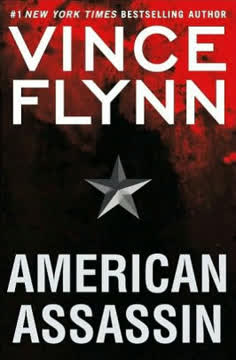
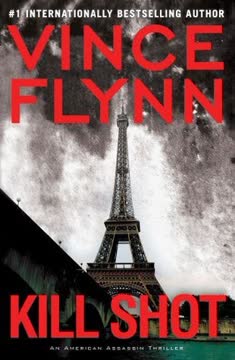
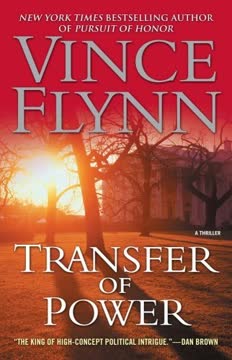
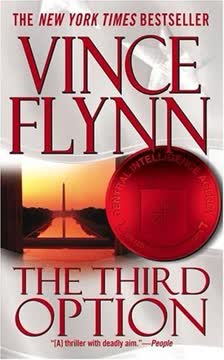
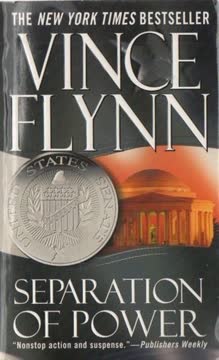
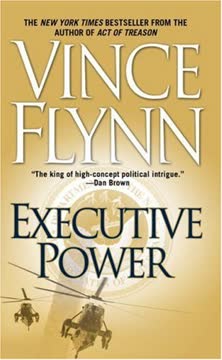
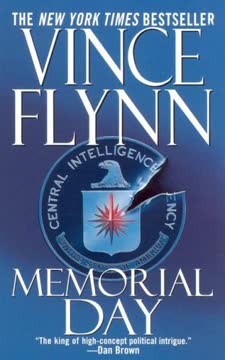
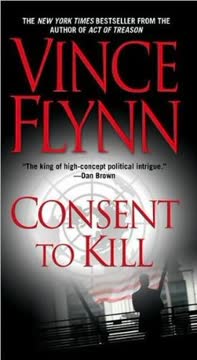
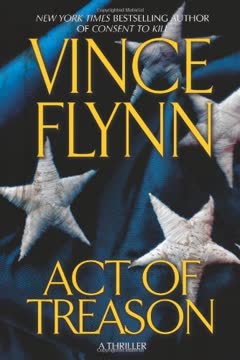
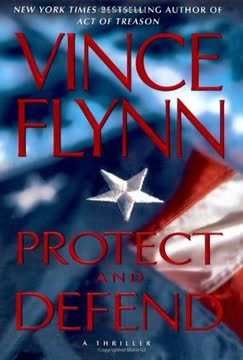
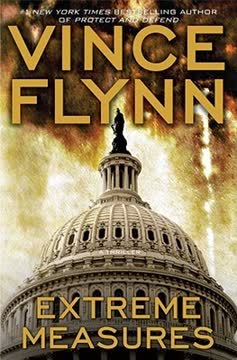
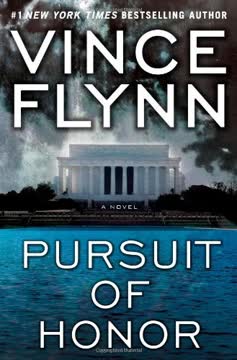
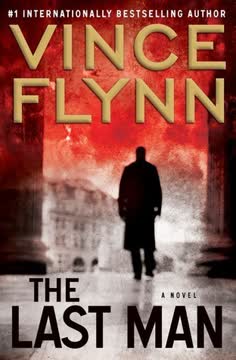
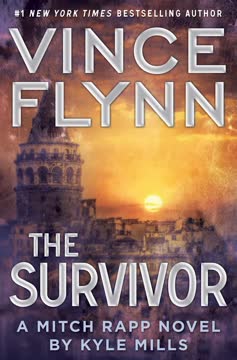
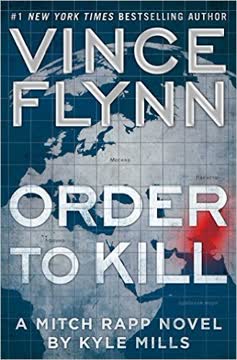
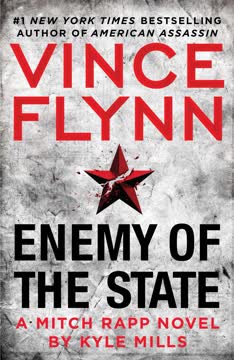
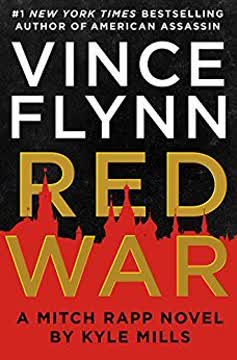
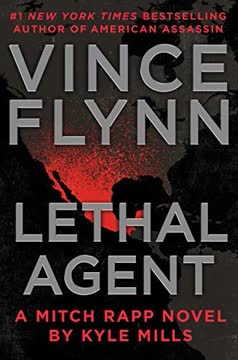
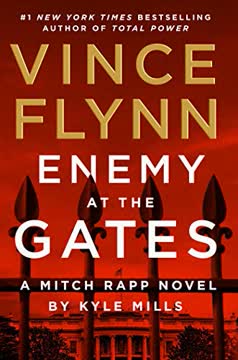
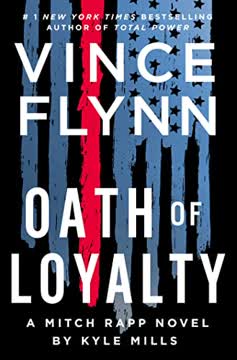
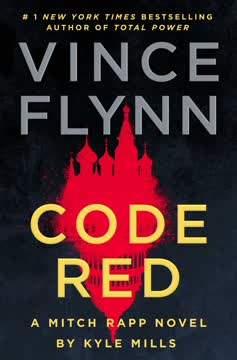
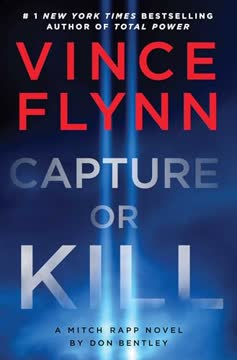
Similar Books
Download PDF
Download EPUB
.epub digital book format is ideal for reading ebooks on phones, tablets, and e-readers.
